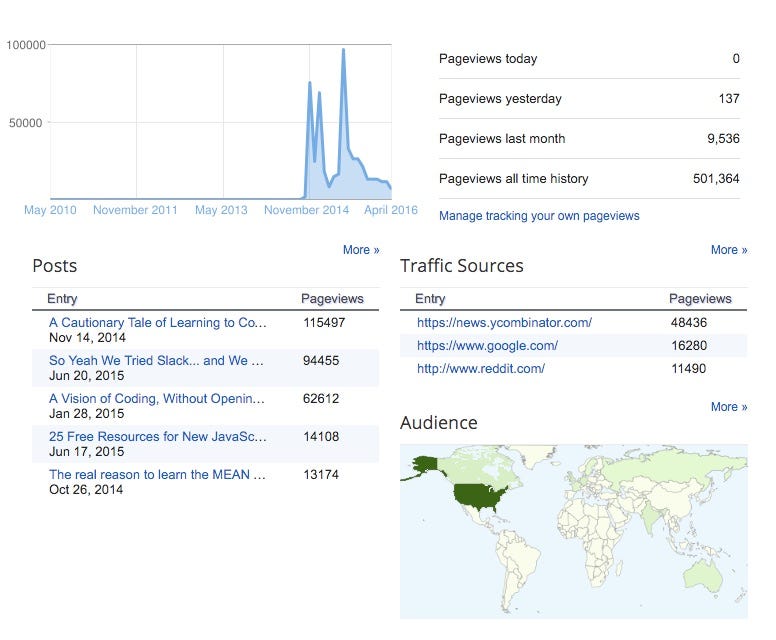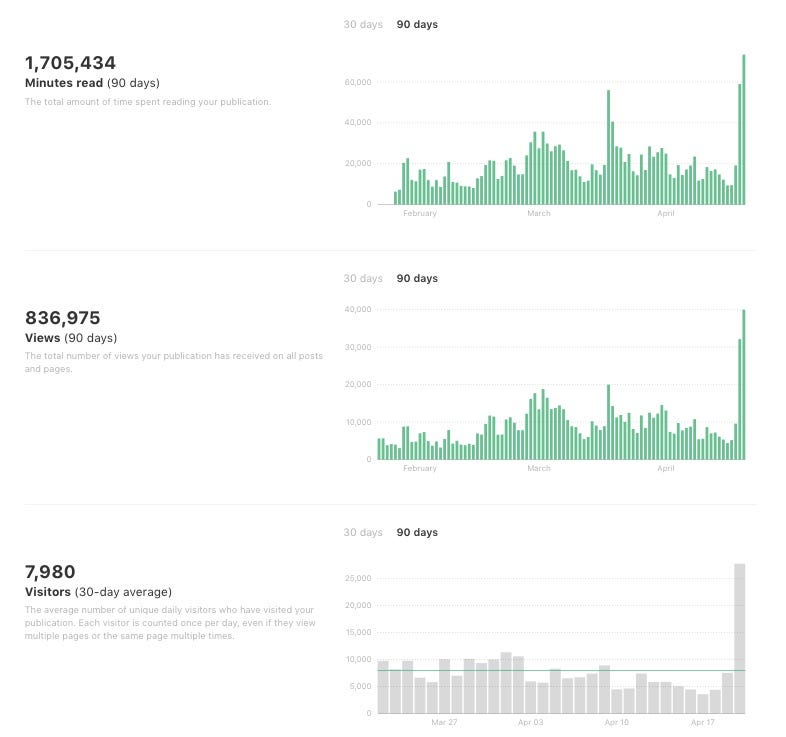We just abandoned our blog for Medium. You probably should, too. — Free Code Camp
Save article ToRead Archive Delete · Log in Log out
5 min read · View original · medium.freecodecamp.com
We just abandoned our blog for Medium. You probably should, too.


Our blog helped our open source community reach an early critical mass.
In the 18 months since we launched our blog, it’s been viewed half a million times.
And yet, shutting it down yesterday was an easy decision.
Here are the final stats:


Our blog posts followed a power law, with half of the readership focused on just three out of the 30 articles we ultimately published.
Those were articles that “got Reddited,” and also reached the top of Hacker News:
- My advice to new developers: A Cautionary Tale of Learning to Code My Own.
- One camper’s explanation of how he codes blind: A Vision of Coding, Without Seeing
- And of course, that time we hit Slack’s undocumented organization size limit and all hell broke loose: So Yeah We Tried Slack… and We Deeply Regretted It
If you clicked through to any of those articles, you probably noticed that they are now Medium posts. We republished each of our blog posts on Medium, then we went into NGINX and created 301 redirects, so that residual Google traffic would be redirected to Medium instead of our blog.
This took several hours of work, and we probably sacrificed some Search Engine Optimization juice in the process, but I’m confident it was worth it.
These statistics should show you why:


We got significantly more views in the past 90 days on Medium than we got in 18 months on our blog. And that was without explosive interest from Hacker News or Reddit.
Why is this?
1. Unless people really care, your blog post is going nowhere.
Getting people to actually go to your blog and read your articles is hard work. You have to share your posts on Twitter, Facebook and LinkedIn, hoping that someone will notice, care enough to read it, then care enough to share it.
Top 10 lists of kitten gifs practically share themselves. But articles about programming? Not so much.
If you’re lucky, someone will care enough to share your article on Reddit or Hacker News. And maybe a few other people will care enough to upvote your article before it slides off the “new” page and into oblivion.
To put things in perspective, every hour Hacker News gets several hundred new submissions. And only nine of those will ever make it to the front page.
2. People don’t have time to read your blog post. They’re too busy reading Medium.
Platforms like Medium, Quora — and to some extent LinkedIn Pulse — offer the single most important ingredient to successful writing: readers.
Millions of people are already actively going to these places thinking “I want to read something.”
While it’s true that literally billions of people are searching Google for specific things they want to read, your blog is much less likely to come up there, because recency is only a small factor in Google’s search results.
With content platforms, new articles are significantly more likely to show up in a given reader’s feed than old articles. So after you publish your article, you are practically guaranteed some audience in the first few hours. This cannot be said for most blogs.
And this early readership is an opportunity for people to not only share your article on social media and places like Reddit — attracting other readers — but also to “recommend” your post within the platform itself — further increasing the number of people the platform’s algorithms show your article to.
This is a virtuous cycle. And it can explode in ways that merely “getting Reddited” cannot. Witness my friend Kristyna’s Medium post, which more than 32,000 people have recommended.
Medium makes it easy for a community to author and distribute articles
There are dozens of reasonable blogging tools to choose from: Wordpress, Ghost, Octopress — even Blogger. But none of them make it as easy to publish your friends’ articles alongside your own as Medium does.
With our old blog, I ended up writing a vast majority of the articles myself. This wasn’t for lack of trying — it was hard to get even the most dedicated members of our community to research interesting articles, then log into our system and write them.
With Medium, anyone can write an article on their own initiative, then submit it to our Medium publication. After some light editing, I can syndicate their article to the tens of thousands of people who follow Free Code Camp’s publication. And there’s no ambiguity that they wrote the article, and at the bottom of the article, there’s a button readers can click to follow them.
We’ve also been able to expand the readership of articles by people from other open source projects, like OhMyZSH.
Medium Publications make it easy to “signal boost” people from other projects and communities, helping them more quickly get the early followers they need to become widely-read thought leaders in their area.
So far in 2016, our open source community has been able to publish roughly one article per day. And only a handful of these articles were written by me. And this is largely thanks to the simplicity and transparency of Medium publications.
A Medium for expression
Moving to Medium is pretty safe. You can subdomain a Medium publication to your own domain. You can also easily export your articles out of Medium if you change your mind.
Medium is still relatively new, and its traffic is steadily growing. The platform itself is under heavy development, and constantly improving.
Medium is quickly cementing itself as “one of those websites people visit every day” — to the extent that major newspapers and magazines are now producing articles specifically for Medium, and President Obama even publishes his speeches here.
Our open source community is growing, too. Our publication gets around 200 new followers a day, and — thanks to this large audience — pretty much everything we publish gets at least 1,000 views.
We plan to keep our publication focused on design, development, data, and open source. If you’re writing about these subjects, and interested in reaching a wider audience, tweet me a link to your article, and we can look into syndicating it.
If you liked this, click the💚 below. Follow me and Free Code Camp for more articles on technology.
